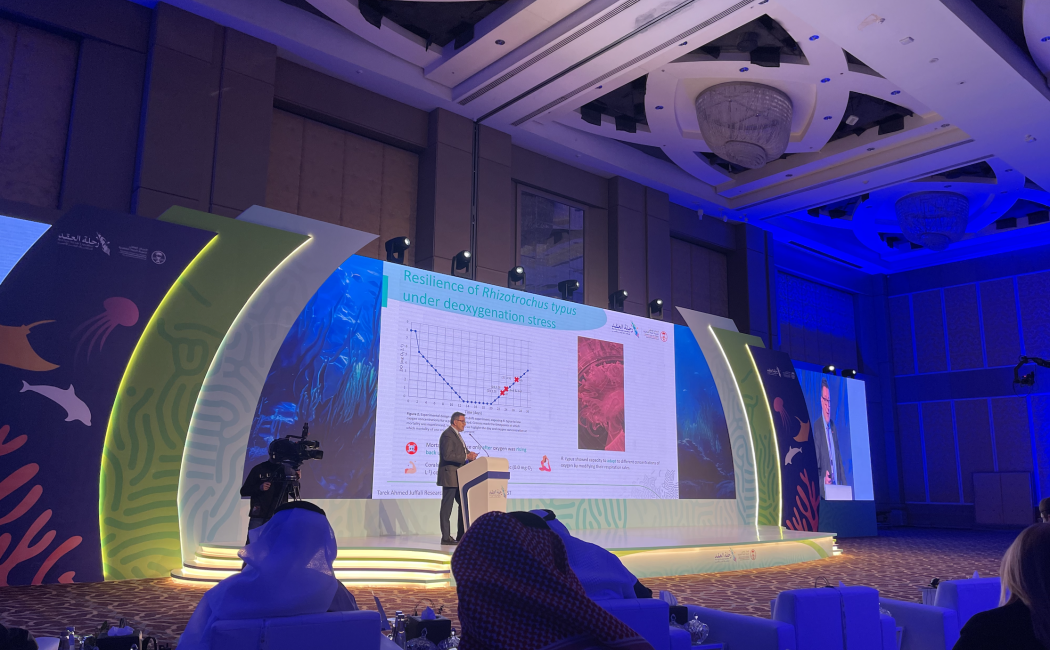
12 February, 2024
In an event that marked a significant milestone for marine science and conservation, the National Center for Wildlife of the Kingdom of Saudi Arabia hosted the Red Sea Decade Expedition Outcomes Symposium on February 11th – 12th, 2024. This landmark symposium, held under the patronage of His Excellency Abdulrahman AlFadley, Minister of Environment, Water, and Agriculture, and Chairman of the Board of the National Center of Wildlife, took place at the Four Seasons Hotel in Riyadh, drawing attention to the critical research and exploration efforts in the Red Sea.
The symposium served as a platform to showcase the extensive findings of the Red Sea Decade Expedition (RSDE), a comprehensive scientific exploration of the Red Sea's unique marine ecosystems. Over two days, the event brought together researchers, scientists, and conservationists from around the globe, including esteemed faculty, staff, and Ph.D. students from the King Abdullah University of Science and Technology (KAUST). The opening day was highlighted by a keynote address from Professor Carlos Duarte, who provided an overview of the expedition's key findings, emphasizing the collaborative efforts and valuable contributions of KAUST research groups. This presentation set the tone for a series of six plenary talks and eleven detailed presentations, each delving into the various aspects of the Red Sea's marine life and ecosystems. The research outcomes from KAUST research groups, including those led by Prof. Carlos Duarte, Prof. Susana Agusti, Prof. Francesca Benzoni, Prof. Danielle Daffonchio, Prof. Froukje van der Zwan, and Prof. Maggie Johnson, were showcased during this event.
TARJC scientists and researchers contributed to this event, each bringing their unique findings to the global stage:
Dr. Shannon Klein explored "Farasan's Blue Holes and Subsurface Sinkholes," bringing to light the mysterious underwater landscapes of the Red Sea.
Dr. Alexandra Steckbauer delved into the "Biology of Deep-Sea Corals in the Red Sea," offering insights into the resilience and diversity of these critical ecosystems.
Dr. Carlos Preckler shared his work on the "Eukaryotic Diversity of the Red Sea," shedding light on the complexity and variety of life forms beneath the surface.
Dr. Christopher Hampel, a bioinformatician, presented a "Metagenomic Assessment of Red Sea Diversity and Genetic Resources," showcasing the power of genetic analysis in uncovering the richness of marine life.
Dr. Sebastian Schmidt-Roach presented his findings on "RSDE Shallow Water Transect Data," providing a comprehensive view of the biodiversity in the lesser-explored shallow waters of the Red Sea.
Our Ph.D. students showcased their pioneering research, highlighting the lab's commitment to nurturing the next generation of marine scientists:
Hugo Mann focused on "Seagrass Blue Carbon in the Red Sea," exploring the vital role of seagrass meadows in carbon sequestration.
Sofia Frappi presented her study on "Elasmobranchs of the Eastern Red Sea," highlighting the importance of sharks and rays in the marine ecosystem.
Anastasia Martynova addressed "Assessing the Abundance of Anthropogenic Seafloor Litter in the Eastern Red Sea," a crucial step towards understanding human impact on marine environments.
Kah Kheng Lim discussed "Stomach Content Characterization of Mesopelagic Lightfish and Lanternfish in the Red Sea through DNA Metabarcoding," offering insights into the feeding patterns and ecological roles of deep-sea fish.
Anieka Parry shared her research on the "Remarkable Thermal Tolerance of a Zooxanthellate Coral Species from the Mesophotic Red Sea," contributing to our understanding of coral resilience to changing ocean temperatures.
Reflecting on the symposium, it's clear that the Red Sea Decade Expedition has opened new avenues for research and conservation, shedding light on the critical importance of preserving our oceans. The findings presented at the symposium not only contribute to our scientific knowledge but also emphasize the urgent need for global conservation efforts to protect these vital ecosystems.
As we look back on this pivotal event, it's evident that the RSDE Symposium was more than just a conference; it was a call to action for marine conservation and a celebration of the mysteries and wonders of the Red Sea. The dedication and hard work of all involved have set a new standard for scientific exploration, ensuring that Saudi Arabia leads ocean conservation initiatives and that the Red Sea will continue to be a source of fascination and study for generations to come.
For further details, please explore the NCW-RSDE website Here.
To view the recordings of the live streaming, you can access them through the following links:
Day One: Watch here
Day Two: Watch here